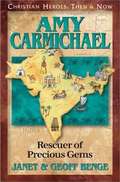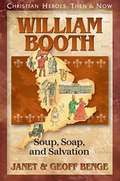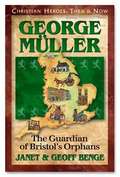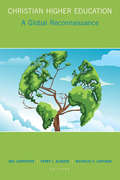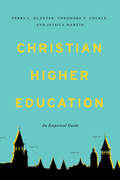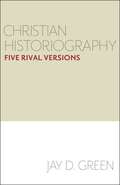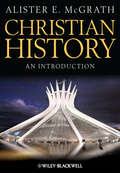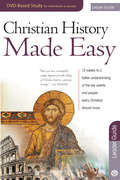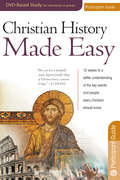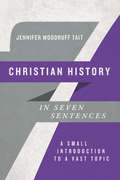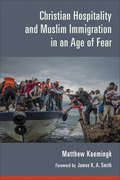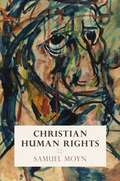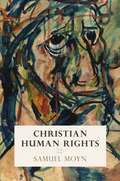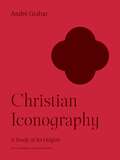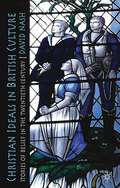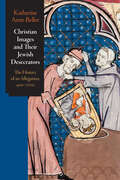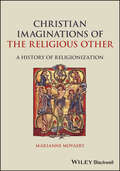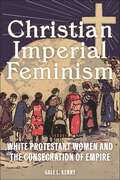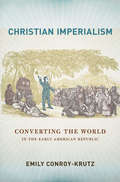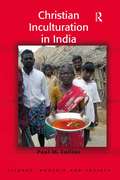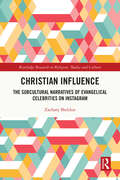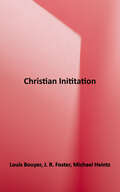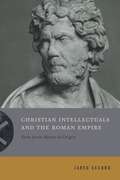- Table View
- List View
Christian Heroes: Rescuer of Precious Gems
by Janet Hazel Benge Geoffrey Francis Benge"Amy Carmichael stood on the deck of the steamer, waving good-bye once again to her old friend Robert Wilson. How could she have known she would never see him or the British Isles again? Amy was certain God had called her to India. Indeed! India would be home for the rest of her life." Amy's life was marked by a simple, determined obedience to God, regardless of circumstances or consequences. Her story and legacy are stunning reminders of the impact of one person who will fear God and nothing else. Driven by love and compassion, and sustained by faith and determination, Amy Carmichael defied the cruel barriers of India's caste system. The story of this young woman from Northern Ireland is a brilliant, sparkling example of God's love generously poured out to "the least of these among us."
Christian Heroes: Soup, Soap, And Salvation
by Janet Benge Geoff BengeHorrified by the poverty and human misery in industrial England, General William Booth and his Salvation Army brought the gospel and life-changing social services to the outcasts of society (1829-1912).
Christian Heroes: The Guardian of Bristol's Orphans
by Janet Benge Geoff BengeThis series chronicles the exciting, challenging, and deeply touching true stories of ordinary men and women whose trust in God accomplished extraordinary exploits for His kingdom and glory. Each inspiring account of a man or woman who answered God s call is a testimony to a real-life adventure of faith and determination.
Christian Higher Education: A Global Reconnaissance
by Joel Carpenter Perry L. Glanzer Nicholas S. LantingaThis book offers a fresh report and interpretation of what is happening at the intersection of two great contemporary movements: the rapid growth of higher education worldwide and the rise of world Christianity. It features on-site, evaluative studies by scholars from Africa, Asia, North America, and South America.Christian Higher Education: A Global Reconnaissance visits some of the hotspots of Christian university development, such as South Korea, Kenya, and Nigeria, and compares what is happening there to places in Canada, the United States, and Europe, where Christian higher education has a longer history. Very little research until now has examined the scope and direction of Christian higher education throughout the world, so this volume fills a real gap.
Christian Higher Education: An Empirical Guide
by Perry L. GlanzerUtilizing a common set of objective institutional markers as a compass, this book guides readers through the terrain of various Christian institutions. The Christian higher education landscape confuses many people. Future students, parents, staff, and even faculty often do not understand the important subtleties and nuances. They need a guide that empirically explores the ways Christian universities operationalize their Christian identity. This book will guide them through the field of Christian higher education and introduce our Operationalizing Christian Identity Guide (OCIG), which identifies the major ways Christian colleges and universities use their Christian identity to make mission, marketing, membership, curriculum, cocurricular, and other decisions (an online spreadsheet of OCIG scores for all the Christian colleges and universities in North America updated in real-time will be available to readers). These markers are identifiable by anyone, no matter their religious or nonreligious background. The OCIG is then employed to provide readers a tour of Protestant, historically Black, Catholic, evangelical/multidenominational, and Eastern Orthodox institutions in the United States and Canada. Parents, students, staff, and faculty will be equipped to engage Christian higher education with a clearer understanding of these key elements and their importance to the mission and purposes of individual institutions and Christian higher education at large.
Christian Historiography: Five Rival Versions
by Jay D. GreenChristian faith complicates the task of historical writing. It does so because Christianity is at once deeply historical and profoundly transhistorical. Christian historians taking up the challenge of writing about the past have thus struggled to craft a single, identifiable Christian historiography. Overlapping, and even contradictory, Christian models for thinking and writing about the past abound―from accountings empathetic toward past religious expressions, to history imbued with Christian moral concern, to narratives tracing God’s movement through the ages. The nature and shape of Christian historiography have been, and remain, hotly contested.
Christian History
by Alister E. McgrathA major new introduction to the global history of Christianity, written by one of the world's leading theologians and author of numerous bestselling textbooks. Provides a truly global review by exploring the development of Christianity and related issues in Asia, Latin America and Africa, and not just focusing on Western concernsSpanning more than two millennia and combining elements of theology, history, and culture, it traces the development of all three branches of Christianity - Catholic, Protestant, and Orthodox - providing context to Christianity's origins and its links to JudaismLooks beyond denominational history at Christianity's impact on individuals, society, politics, and intellectual thought, as well as on art, architecture, and the natural sciencesCombines McGrath's acute historical sensibility with formidable organizational skill, breaking the material down into accessible, self-contained historical periods Offers an accessible and student-oriented text, assuming little or no advance theological or historical knowledge on the part of the reader
Christian History Made Easy Leader Guide
by Timothy Paul JonesPeople and Events Every Christian Should Know In this 12-session DVD-based study, Dr. Timothy Paul Jones takes you through the most important events in Christian history from the time of the apostles to today. He brings to life the fascinating people and events that shaped our world. This isn't dry names and dates. It's full of dramatic stories told with a touch of humor. This series, based on Dr. Jones's popular award-winning book Christian History Made Easy, ties in spiritual lessons believers can glean by looking at the past, and shows how God was still working in his church despite all the ups and downs. You will learn: * The fascinating stories of people such as St. Patrick, Martin Luther, and Augustine. * People who changed history: Constantine, Charlemagne, and Francis of Assisi * How we got the Bible that we read today -- John Wycliffe, William Tyndale and others. * The Middle Ages and the Reformation: Kings and Queens, Monks and Reformers * Where church doctrines and practices originated. * How the Catholic, Orthodox, and Protestant churches came to be. * Reason and Revival - How modernity and the scientific revolution affected Christianity. * How Christianity has spread around the world You don't have to be an expert to lead this 12-session study. Perfect for small groups, Bible studies, or personal use. Ages: Young adult to adult. The Sessions The 12 sessions cover major eras and topics with plenty of stories and humor. You'll cover the early church, monasticism, medieval conflicts, the Protestant Reformation, the Great Awakening, 19th-century missions, modernity, and postmodernism.
Christian History Made Easy Participant Guide
by Timothy Paul JonesPeople and Events Every Christian Should Know In this 12-session DVD-based study, Dr. Timothy Paul Jones takes you through the most important events in Christian history from the time of the apostles to today. He brings to life the fascinating people and events that shaped our world. This isn't dry names and dates. It's full of dramatic stories told with a touch of humor. This series, based on Dr. Jones's popular award-winning book Christian History Made Easy, ties in spiritual lessons believers can glean by looking at the past, and shows how God was still working in his church despite all the ups and downs. You will learn: * The fascinating stories of people such as St. Patrick, Martin Luther, and Augustine. * People who changed history: Constantine, Charlemagne, and Francis of Assisi * How we got the Bible that we read today -- John Wycliffe, William Tyndale and others. * The Middle Ages and the Reformation: Kings and Queens, Monks and Reformers * Where church doctrines and practices originated. * How the Catholic, Orthodox, and Protestant churches came to be. * Reason and Revival - How modernity and the scientific revolution affected Christianity. * How Christianity has spread around the world You don't have to be an expert to lead this 12-session study. Perfect for small groups, Bible studies, or personal use. Ages: Young adult to adult. The Sessions The 12 sessions cover major eras and topics with plenty of stories and humor. You'll cover the early church, monasticism, medieval conflicts, the Protestant Reformation, the Great Awakening, 19th-century missions, modernity, and postmodernism.
Christian History in Seven Sentences: A Small Introduction to a Vast Topic (Introductions in Seven Sentences)
by Jennifer Woodruff Tait"No one whatsoever should be denied the opportunity to give his heart to the observance of the Christian religion." —The Edict of Milan (AD 313)"Light from Light, true God from true God, begotten not made, of one substance from the Father." —The Nicene Creed (325)"When our Lord and Master Jesus Christ said, 'Repent,' he willed the entire life of believers to be one of repentance." —Martin Luther's Ninety-Five Theses (1517)"The church is confronted today, as in no preceding generation, with a literally worldwide opportunity to make Christ known." —The Edinburgh Conference (1910)
Christian Hospitality and Muslim Immigration in an Age of Fear
by James K. Smith Matthew KaemingkAn alternative, uniquely Christian response to the growing global challenges of deep religious differenceIn the last fifty years, millions of Muslims have migrated to Europe and North America. Their arrival has ignited a series of fierce public debates on both sides of the Atlantic about religious freedom and tolerance, terrorism and security, gender and race, and much more. How can Christians best respond to this situation?In this book theologian and ethicist Matthew Kaemingk offers a thought-provoking Christian perspective on the growing debates over Muslim presence in the West. Rejecting both fearful nationalism and romantic multiculturalism, Kaemingk makes the case for a third way—a Christian pluralism that is committed to both the historic Christian faith and the public rights, dignity, and freedom of Islam.
Christian Hospitality and Muslim Immigration in an Age of Fear
by Matthew KaemingkAn alternative, uniquely Christian response to the growing global challenges of deep religious differenceIn the last fifty years, millions of Muslims have migrated to Europe and North America. Their arrival has ignited a series of fierce public debates on both sides of the Atlantic about religious freedom and tolerance, terrorism and security, gender and race, and much more. How can Christians best respond to this situation?In this book theologian and ethicist Matthew Kaemingk offers a thought-provoking Christian perspective on the growing debates over Muslim presence in the West. Rejecting both fearful nationalism and romantic multiculturalism, Kaemingk makes the case for a third way—a Christian pluralism that is committed to both the historic Christian faith and the public rights, dignity, and freedom of Islam.
Christian Human Rights
by Samuel MoynThis edition supports the United Nations Charter, 1945-- To reaffirm faith in fundamental human rights, in the dignity and worth of the human person...
Christian Human Rights
by Samuel MoynIn Christian Human Rights, Samuel Moyn asserts that the rise of human rights after World War II was prefigured and inspired by a defense of the dignity of the human person that first arose in Christian churches and religious thought in the years just prior to the outbreak of the war. The Roman Catholic Church and transatlantic Protestant circles dominated the public discussion of the new principles in what became the last European golden age for the Christian faith. At the same time, West European governments after World War II, particularly in the ascendant Christian Democratic parties, became more tolerant of public expressions of religious piety. Human rights rose to public prominence in the space opened up by these dual developments of the early Cold War.Moyn argues that human dignity became central to Christian political discourse as early as 1937. Pius XII's wartime Christmas addresses announced the basic idea of universal human rights as a principle of world, and not merely state, order. By focusing on the 1930s and 1940s, Moyn demonstrates how the language of human rights was separated from the secular heritage of the French Revolution and put to use by postwar democracies governed by Christian parties, which reinvented them to impose moral constraints on individuals, support conservative family structures, and preserve existing social hierarchies. The book ends with a provocative chapter that traces contemporary European struggles to assimilate Muslim immigrants to the continent's legacy of Christian human rights.
Christian Hymns
by The Evangelical Movement of WalesThis is a nondenominational collection of 942 hymns published in Wales and Welsh congregations are well-known for their excellent singiing. This collection, however, is words-only; the names of the hymn-tunes and their composers are not given. You may look them up on the website Hymnary.org. Some of the prolific hymn writers whose hymns are in this collection include Charles Wesley (84 hymns), Isaac Watts (59 hymns), The Moravian James Montgomery (26 hymns), the English non-conformist Philip Dodridge (19 hymns) and John Newton (the slave trader turned repentant Christian), (19 hymns). As with other hymnbooks on Bookshare, this too has DAISY markup for each hymn at level 2 and major subject breakdowns at level 1. There is an alphabetical index of first lines without punctuation to aid in searching for a hymn title. In a BRF file, Bookshare software will create a lengthy table of contents followed by the text of the hymn book. For other hymn collections on Bookshare see also The New Believers Hymn Book; Gospel Hymn Book; The United Methodist Hymnal; Glory to God (Presbyterian); Evangelical Lutheran Worship (ELCA); and Lutheran Servicebook: Psalms and Hymns (Missouri Synod). For texts of cantatas by Johann Sebastian Bach, see The Church Cantatas of J. S. Bach by Alec Robinson (with commentary), and Johann Sebastian Bach: The Complete Cantatas in German-English translations by Richard Stokes.
Christian Iconography: A Study of Its Origins (The A. W. Mellon Lectures in the Fine Arts #10)
by André GrabarAn illuminating look at the iconography of the early church and its important place in the history of Christian artIn this book, historian André Grabar demonstrates how early Christian iconography assimilated contemporary imagery of the time. Grabar looks at the most characteristic examples of paleo-Christian iconography, dwelling on their nature, form, and content. He explores the limits of originality in such art, its debt to figurative art, and the broader cultural climate in the Roman Empire, drawing a distinction between expressive images—that is, genuine works of art—and informative ones. Throughout, Grabar establishes the importance of imperial iconography in the development of Christian portraits and sheds light on the role they played alongside other forms of Christian piety in their day.
Christian Ideals in British Culture
by David NashThis book offers a challenge to conventional histories of secularisation by focusing upon the importance of central religious narratives. These narratives are changed significantly over time, but also to have been invested with importance and meaning by religious individuals and organisations as well as by secular ones.
Christian Images and Their Jewish Desecrators: The History of an Allegation, 400-1700 (Jewish Culture and Contexts)
by Katherine Aron-BellerIn Christian Images and Their Jewish Desecrators, historian Katherine Aron-Beller analyzes the common Christian charge that Jews habitually and compulsively violated Christian images, identifying this allegation as one that functioned alongside other anti-Jewish allegations such as ritual murder, blood libel, and host desecration to ultimately inform dangerous and long-lasting prejudices in medieval and early modern Europe. Through an analysis of folk tales, myths, legal proceedings, and religious art, Aron-Beller finds that narratives alleging that Jews committed violence against images of Christ, Mary, and the disciples flourished in Europe between the fifth and seventeenth centuries. She then explores how these narratives manifested differently across the continent and the centuries, finding that their potency reflected not Jewish actions per se, but Christians’ own concerns about slipping into idolatry when viewing depictions of religious figures. In addition, Aron-Beller considers Jews’ own attitudes toward Christian imagery and the ways in which they responded to and rejected—or embraced—such allegations. By examining how desecration allegations affected Jewish individuals and communities spanning Byzantium, medieval England, France, Germany, and early modern Spain and Italy, Aron-Beller demonstrates that this charge was a powerful expression of the Christian majority’s anxiety around committing idolatry and their eagerness to participate in practices of veneration that revolved around visual images—an anxiety that evolved through the centuries and persists to this day.
Christian Imaginations of the Religious Other: A History of Religionization
by Marianne MoyaertExplores how Christians created, used, and adapted religionized categories of non-Christians through the centuries Christian Imaginations of the Religious Other traces the genealogy of religionization, the various ways Christians throughout history have created a sense of religious normativity while simultaneously producing various categories of non-Christian "otherness." Covering a broad expanse of processes, practices, and socio-political contexts, this innovative volume analyzes the complex intersections of patterns of religionization in different eras while investigating their entanglements with racialization, sexualization, and ethnicization. With a readable and accessible style, Marianne Moyaert offers a nuanced and well-balanced critical analysis of how and why Christianity’s otherswere named, categorized, essentialized, and governed by those exemplifying Christian normativity in Western European society. The author takes a longue durée approach — a long-term perspective on history that extends past human memory and the archaeological record — that integrates different case studies and a variety of ecclesial, theological, and literary documents. Throughout the text, Moyaert demonstrates how religionization shaped the ways Christians classified people, organized Christian societies, interacted with different Christian and non-Christian groups, and more. Surveys the relationship between shifts in Christian normativity and the way non-Christians are imagined Helps readers connect the lasting effects of patterns of religionization with their everyday experiences Discusses the role of Christian expansion in the differential and unequal treatment of Christianity’s others Examines legal regulations and disciplinary practices that were established to define the boundaries between Christians and non-Christians Incorporates a wide range of scholarly resources, cutting-edge research, and the most recent insights and issues in the field Includes textboxes with helpful summaries, illustrations, and commentary in each chapter Christian Imaginations of the Religious Other: A History of Religionization is an excellent textbook for undergraduate and graduate courses ininterreligious studies, comparative theology, theological approaches to religious diversity, Christian-Jewish-Muslim relations, race and religion, and theorizing religion."Professor Moyaert is one of the world’s best scholars of comparative theology. In this magisterial new work, she helps scholars of religion to better learn how religious images, whether drawn with pictures or words, are crucial to how we understand ourselves and each other." - Amir Hussain, President, American Academy of Religion"Breathtaking in scope and detail, Moyaert offers an original history of the ways Christians have projected distorted images of their religious ‘others,’ with devastating material consequences. Her illuminating story of the past is a searchlight for our present." - Jeannine Hill Fletcher, Professor of Theology, Fordham University"Christian Imaginations is a superb study of the role that Western political programs play in the historical construction of identity boundaries. Analytically erudite and socially committed, Moyaert’s book powerfully interrogates what counts as religion making this text a must-read for anyone interested in interreligious studies." - Santiago Slabodsky, Florence and Robert Kaufman Professor in Jewish Studies, Hofstra University"Raising the historical formation of religious identities to the level of contemporary treatments of gender and racialization, Christian Imaginations of the Religious Other is essential reading for students of religion." - Michelle Voss, Professor of Theology and Past Principal, Emmanuel College of Victoria University in the University of Toronto"Crafting a Western European mosaic of religionization's turbulent
Christian Imperial Feminism: White Protestant Women and the Consecration of Empire (North American Religions)
by Gale L. KennyIlluminates how white American Protestant women embraced a racially specific version of socialinclusiveness that centered themselves as the normAmidst the global instability of the early twentieth century, white Christian American women embracedthe idea of an “empire of Christ” that was racially diverse, but which they believed they were uniquelyqualified to manage. America’s burgeoning power, combined with women’s rising roles within thechurch, led to white Protestant women adopting a feminism rooted in religion and imperialism.Gale L. Kenny examines this Christian imperial feminism from the women’s missionary movement tocreate a Christian world order. She shows that this Christian imperial feminism marked a break from anearlier Protestant world view that focused on moral and racial purity and in which interactions amongraces were inconceivable. This new approach actually prioritized issues like civil rights and racialintegration, as well as the uplift of women, though the racially diverse world Christianity it aspired towas still to be rigidly hierarchically ordered, with white women retaining a privileged place as guardians.In exposing these dynamics, this book departs from recent scholarship on white evangelical nationalismto focus on the racial politics of white religious liberalism. Christian Imperial Feminism adds a necessarylayer to our understanding of religion, gender, and empire.
Christian Imperialism: Converting the World in the Early American Republic (The United States in the World)
by Emily Conroy-KrutzIn 1812, eight American missionaries, under the direction of the recently formed American Board of Commissioners for Foreign Missions, sailed from the United States to South Asia. The plans that motivated their voyage were ano less grand than taking part in the Protestant conversion of the entire world. Over the next several decades, these men and women were joined by hundreds more American missionaries at stations all over the globe. Emily Conroy-Krutz shows the surprising extent of the early missionary impulse and demonstrates that American evangelical Protestants of the early nineteenth century were motivated by Christian imperialism—an understanding of international relations that asserted the duty of supposedly Christian nations, such as the United States and Britain, to use their colonial and commercial power to spread Christianity. In describing how American missionaries interacted with a range of foreign locations (including India, Liberia, the Middle East, the Pacific Islands, North America, and Singapore) and imperial contexts, Christian Imperialism provides a new perspective on how Americans thought of their country’s role in the world. While in the early republican period many were engaged in territorial expansion in the west, missionary supporters looked east and across the seas toward Africa, Asia, and the Pacific. Conroy-Krutz’s history of the mission movement reveals that strong Anglo-American and global connections persisted through the early republic. Considering Britain and its empire to be models for their work, the missionaries of the American Board attempted to convert the globe into the image of Anglo-American civilization.
Christian Inculturation in India (Liturgy, Worship and Society Series)
by Paul M. CollinsDrawing together international and Indian sources, and new research on the ground in South India, this book presents a unique examination of the inculturation of Christian Worship in India. Paul M. Collins examines the imperatives underlying the processes of inculturation - the dynamic relationship between the Christian message and cultures - and then explores the outcomes of those processes in terms of architecture, liturgy and ritual, and the critique offered of these outcomes, especially by Dalit theologians. This book highlights how the Indian context has informed global discussions, and how the decisions of the World Council of Churches, Vatican II and Lambeth Conferences have impacted upon the Indian context.
Christian Influence: The Subcultural Narratives of Evangelical Celebrities on Instagram (Routledge Research in Religion, Media and Culture)
by Zachary SheldonChristian Influence examines how understudied evangelical media celebrities use Instagram to cultivate religious authority and to convey distinctive subcultural narratives about evangelical values and culture today.The book explores the way that discrete kinds of evangelical celebrities—Celebrity Pastors, Women’s Ministry Leaders, Christian-Media Celebrities, and Secular-Media Celebrity Christians—all used Instagram across 2020–2021 to perform specific subcultural narratives to their followers. Detailing these narratives gives unique insights into how the authority of celebrities and the affordances of social media are combining to challenge the strictures of authority within evangelicalism and raises questions about celebrity power in the contemporary shaping and reshaping of evangelical culture.Christian Influence is a useful and timely read for scholars with an interest in evangelicalism specifically, or religion and religious studies, media and cultural studies, sociology of religion, and communication more broadly.
Christian Initiation
by Louis BouyerChristian Initiation, first published in 1958, serves in many ways as a point of entry for the magnificent theological oeuvre of Louis Bouyer. Addressing the central elements of the Christian faith in a simple and straightforward manner, the book is meant as an initiation into Christian truth and life for those who profess—or hope to profess—faith in Jesus Christ. <p><p>Each chapter is a “discovery” of that new life that Christ brings to the believer, infusing each and every experience with the light of his own risen glory. In Christian Initiation, as in all his works, Bouyer emphasizes that the truth of the Gospel is a life to be lived in Christ Jesus and passed along, through sacramental grace, to his disciples for the joyful integration of truth and life.
Christian Intellectuals and the Roman Empire: From Justin Martyr to Origen (Inventing Christianity #2)
by Jared SecordEarly in the third century, a small group of Greek Christians began to gain prominence and legitimacy as intellectuals in the Roman Empire. Examining the relationship that these thinkers had with the broader Roman intelligentsia, Jared Secord contends that the success of Christian intellectualism during this period had very little to do with Christianity itself.With the recognition that Christian authors were deeply engaged with the norms and realities of Roman intellectual culture, Secord examines the thought of a succession of Christian literati that includes Justin Martyr, Tatian, Julius Africanus, and Origen, comparing each to a diverse selection of his non-Christian contemporaries. Reassessing Justin’s apologetic works, Secord reveals Christian views on martyrdom to be less distinctive than previously believed. He shows that Tatian’s views on Greek culture informed his reception by Christians as a heretic. Finally, he suggests that the successes experienced by Africanus and Origen in the third century emerged as consequences not of any change in attitude toward Christianity by imperial authorities but of a larger shift in intellectual culture and imperial policies under the Severan dynasty. Original and erudite, this volume demonstrates how distorting the myopic focus on Christianity as a religion has been in previous attempts to explain the growth and success of the Christian movement. It will stimulate new research in the study of early Christianity, classical studies, and Roman history.
